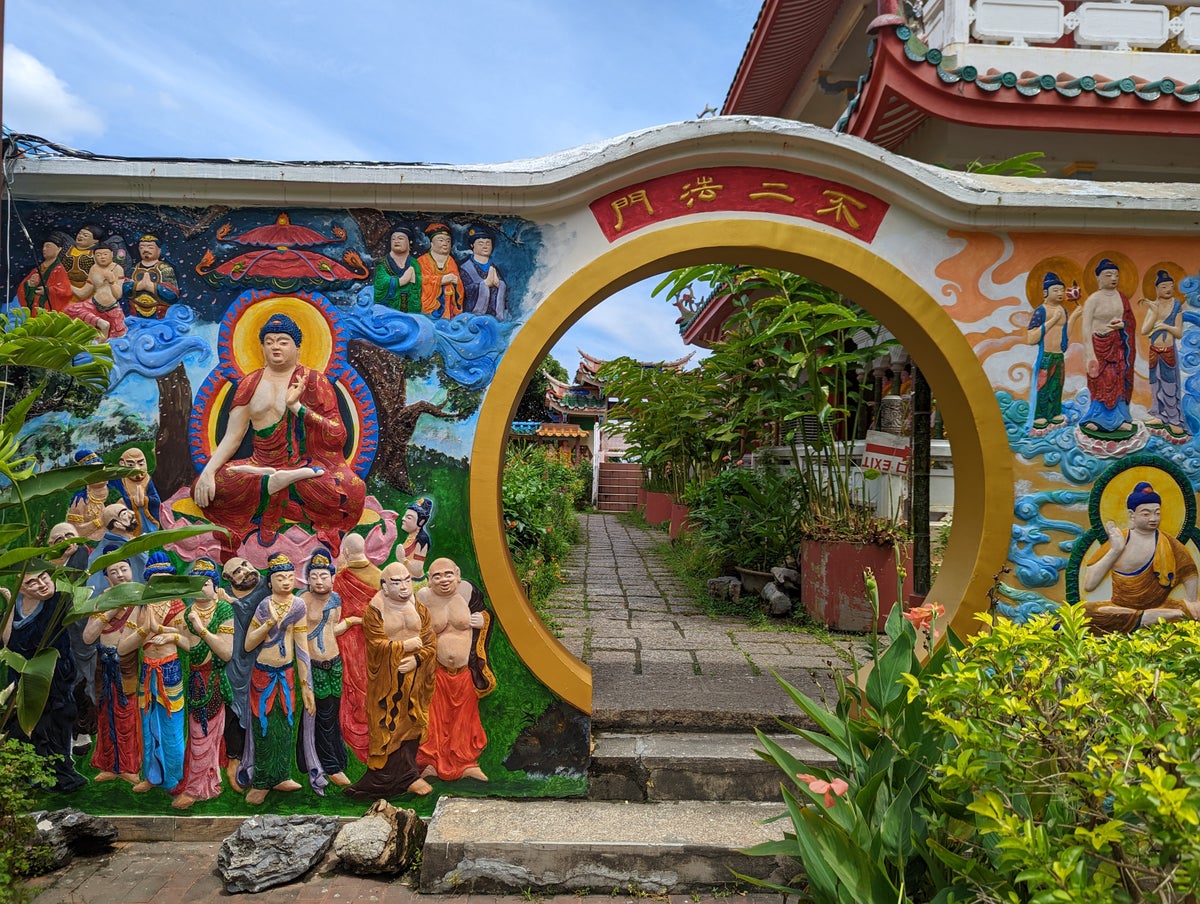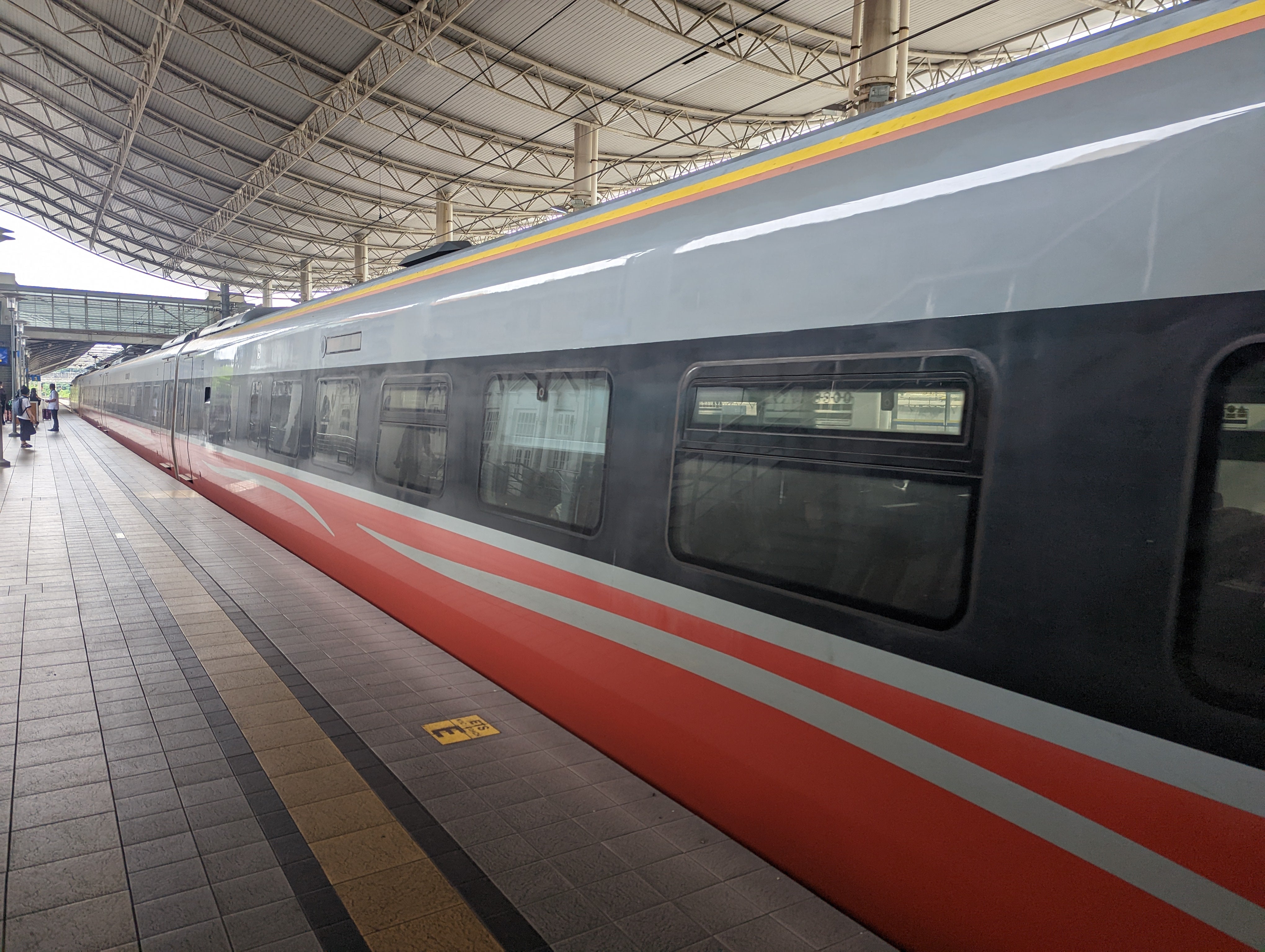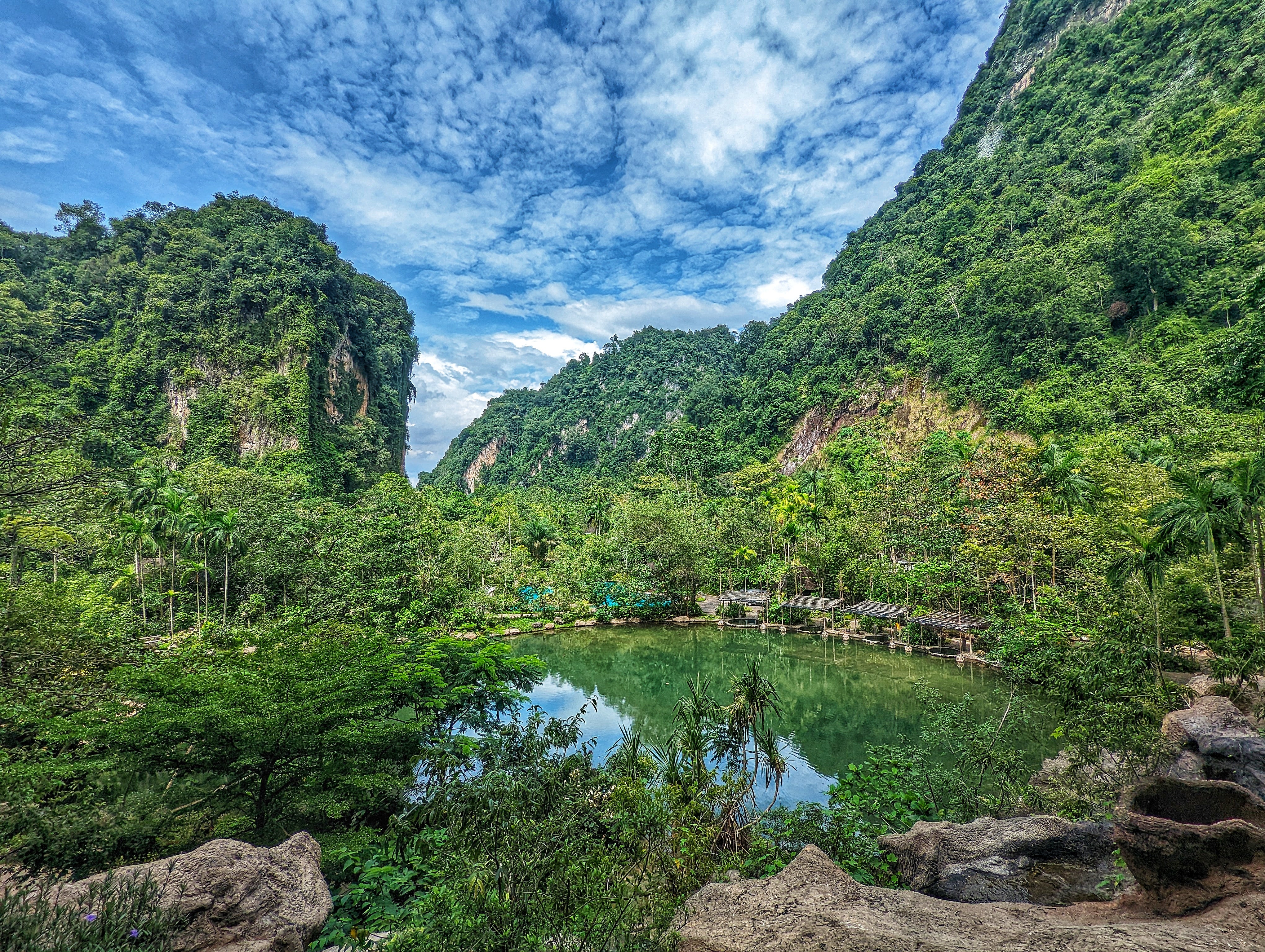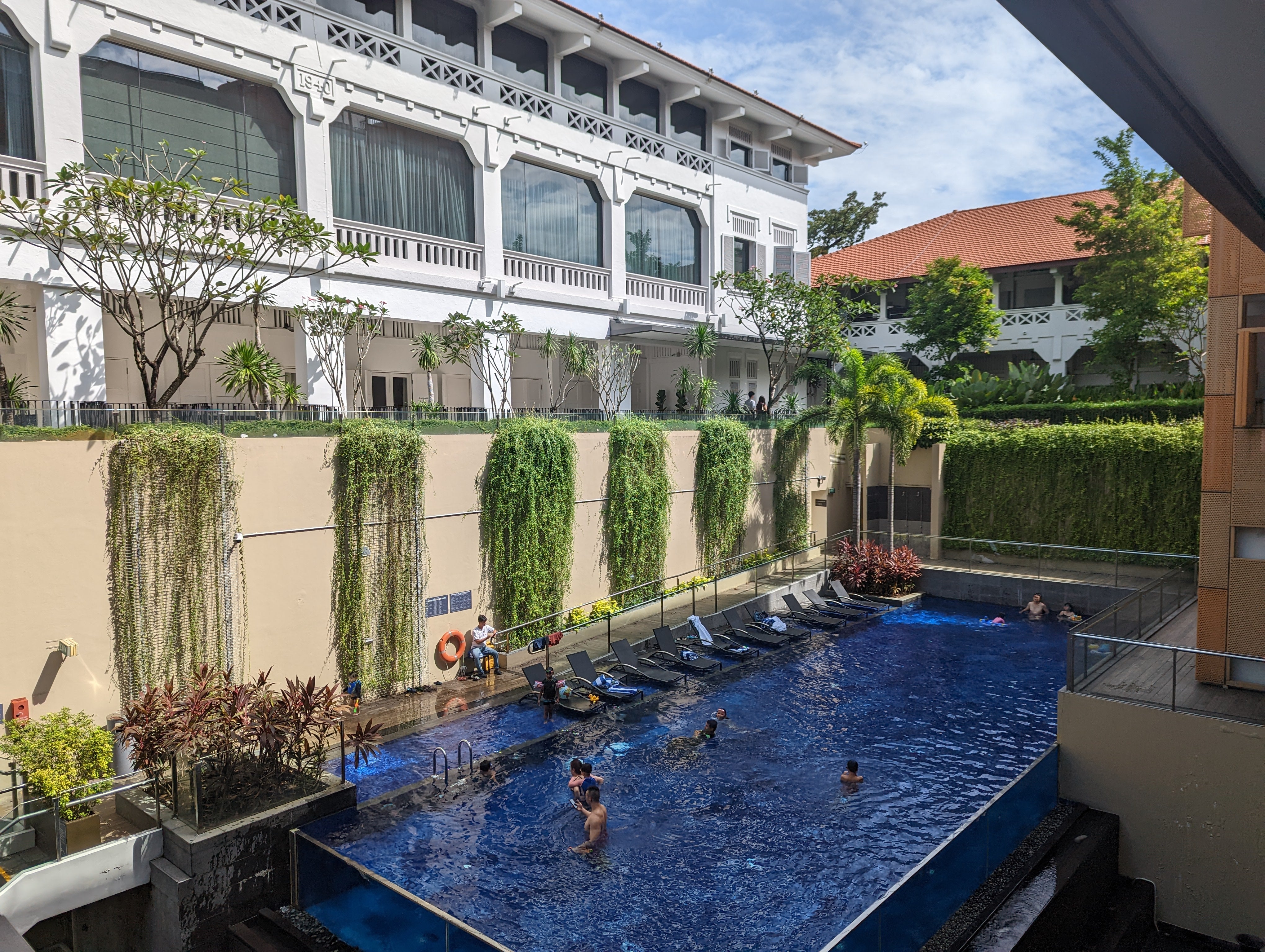
On the rumbling, slow train from Gemas, southern Malaysia, I’m seated between a family of seven Tamil-Malaysian women, tiffin boxes clanging as they offer me some lunch. After snapping the obligatory selfies, we have a chat about marriage - they’re on their way to a family wedding in Johor Bahru, a big city and land gateway to Singapore. The train lurches, stopping and starting.
It’s the last stretch of track in Malaysia without a high speed service and the gentle pace gives me cinematic views of seemingly endless fields of palm trees, occasionally punctuated by colourful, faded village homes. Even the elegant old gents cycling on the road parallel to our track are moving faster than this train. “I want to marry an Englishman,” says the teen sister among the group, third of the four generations of women and head babysitter. I tell her I don’t have any suitable cousins, but wish her much luck with the plan.
I’m on my fifth train in five days. These are the final few hours before I reach my final destination, Singapore, for its annual Writers Festival, one of the world’s only trilingual literary events.
Having never been to Malaysia before, and blessed with some time between stops, I opted to travel by land, taking in one of Asia’s greenest and most multicultural countries along the way
You don’t have to tell me that flying from Bangkok to Singapore would have been faster. But having never been to Malaysia before, and blessed with some time between stops, I opted to travel by land, taking in one of Asia’s greenest and most multicultural countries along the way. The spacious, comfortable trains here have no luggage restrictions on board, meaning I can haul some treats from the Thai capital, and they offer captivating, scenic landscapes along the way - not to mention the friendly locals to chat to.
I board the night train from Bangkok five evenings beforehand, taking the recently reinstated Special Express 45, which leaves the capital’s charming old Hua Lamphong station daily at 3.10pm. I feel a twinge of excitement as I trundle my case over the marble tiled floors, just in time to take my two-person-wide seat on the night train. This feels so much more exciting than waiting, bored, at an airport gate for a two-hour-25-minute flight from BKK to SIN. As we set off, I spend a few hours gazing out of the window, zoning out as the city turns into rural rice fields, before darkness curtains the view and the conductor comes to convert our seats into cosy bunks.

My bunk neighbours are a mother and her eight-year-old son, who are heading to Songkhla, the last stop in southern Thailand before we cross to Padang Besar, Malaysia. The little boy is engrossed in his iPad game, but asks me questions in impressive English between scoring points. “Are you English?” Yes. “Where are you going?” Singapore. “Do you like croissants?” Yes. He’s clocked my fruit and pastry pile, packed to see me through the night. Before they disembark the next morning, he’s told me all about his quadrilingual life and his mum makes me promise to visit when I’m next in Songkhla.
Crossing into Malaysia is easy; our passports are stamped in a matter of minutes, before I hop onboard a comparatively swish KTM train carriage, ready to whizz me to Butterworth. Here I pick up the ferry bound for Georgetown, Penang’s delightful Unesco-protected old town. It’s somewhere that has captured my imagination for decades, and the reality doesn’t disappoint.
The former trading port is full of Chinese shophouses and South Indian dhabas - the roadside food shacks that sell all my favourite dishes. I spend lunch and dinner time eating in Georgetown’s Little India, gorging on dosa; the savoury pancake of sorts that comes with samba (a lentil and veg stew) and mint based chutneys. Malaysia is known for its diverse food scene, having a population made up of Chinese, Malayan and Tamil Indian people, among other nationalities. The possibilities for insanely good grub are seemingly endless.
Georgetown, Penang is somewhere that has captured my imagination for decades, and the reality doesn’t disappoint
Aside from wandering the streets of Georgetown to take in the 19th-century Hakka and Teochew architecture, the highlight of my brief sojourn here is visiting the largest Buddhist temple in Malaysia: Kek Lok Si. Perched on the hillside, overlooking the city and port below, the temple is a pilgrimage site for Buddhists from across Southeast Asia. It’s a sprawling, colourful complex, complete with a seven-storey pagoda that was donated by Thailand in 1930.
After Penang, a quick and easy one-hour-40-minute train journey deposits me at the palatial train station in Ipoh, the capital of a former tin mining district, and my standout stop of the trip. I’m here for some chill time at the Banjaran Hotsprings Retreat, a magnet for water babies like me and one of those “pinch yourself”, verdant rural locations this region does so well.
Set on a geothermal lake surrounded by a cluster of little peaks, covered in dense greenery, Banjaran offers day-spa visits that are easy to book on a whim, say, mid-train-journey. Nature is only ever so slightly tamed here; the natural caves (one for steam, two for meditation) are structurally untouched, as is the central lake. I soak in the lakeside tubs, wowed by the tropical scenery all around.

Steamed and mellowed out, I move on to Malaysia’s vast, fast-paced capital, Kuala Lumpur, grabbing a bowl of delicious cendol at Ipoh station to graze on throughout the two hour train ride. The Malaysian iced desert is particularly tasty on a hot day, and I sip the last of the cold coconut milk as we pull into KL Sentral Station. The city, much like the surrounding region, is delightfully green, with acres of ferns and shrubs cropping up in wedges between the slick highways. I stroll the markets in search of the gorgeous local batik fabrics, before taking the comprehensive metro service to the undeniably impressive Petronas Towers, KL’s much-photographed twin towers that I’m determined to see before departing. I’m not the only visitor who’s impressed, as small groups of Malayan girls jostle for the best spot, posing for photos in front of the looming skyscrapers.
I haven’t merely passed over a country; I’ve really been through it, tasting the food, meeting the people and seeing so many miles up close and in colour.
Finally arriving in Singapore after a blink-and-you’ll-miss-it train shuttle from Johor Bahru, I take the metro across the island to reach its buzzy city centre. The distance travelled suddenly hits me: while I’ve come very far and seen such a lot, a low-key Bangkok to Singapore rail jaunt is entirely feasible. I haven’t merely passed over a country; I’ve really been through it, tasting the food, meeting the people and seeing so many miles up close and in colour.
Feeling jubilant, I zip to Gardens by the Bay, whose dazzling night-time lights congratulate me on my longest flight-free journey thus far. As I stare over the skyline at them, glowing like manmade constellations, I let my mind wander across the globe, dreaming of new continents to cross by rail.
How to do it
Tickets for the night train from Bangkok to Padang Besar available from Thai Railways.
Trains through Malaysia (Padang Besar-Butterworth-Ipoh-Kuala Lumpur-Johor Bahru) are available online from KTM; you can buy the ticket on your phone and show it to the driver without printing it out.
The shuttle service between Johor Bahru’s JB Sentral and Singapore Woodlands takes five minutes itself, aside from going through immigration. Buying the shuttle ticket online in advance is recommended, as it does sell out.

Where to stay
The Prestige, Penang
This boutique period property may be all columns from the outside, but inside it’s sleek golden fittings and plush fabrics giving a modern-day spin on Victorian design. Don’t miss the views from the rooftop pool.
One for very special trips, the Banjaran is ultra luxurious, with every single villa housing its own geothermal hot tub and cold dipping pool. The resort is a real one-off, and has made the most of its magical, hot spring setting, by installing a world class restaurant and spa next to the lake.
Amari, Kuala Lumpur
A delightfully cool new branch of Amari Hotels, awash with vibrant, jazzy decor and upbeat electro playing throughout, plus intensely comfy beds to rest in for the night after having a quick swim in the infinity pool.
Oasia Resort Sentosa, Singapore
This laid back, wellness-focused hotel is elegant yet family friendly, full of engaging sustainability initiatives that are ingrained into the stay. Breakfast is made to order, the pool is masterful in design and the spa offers a spot of forest bathing after an incredible massage.







